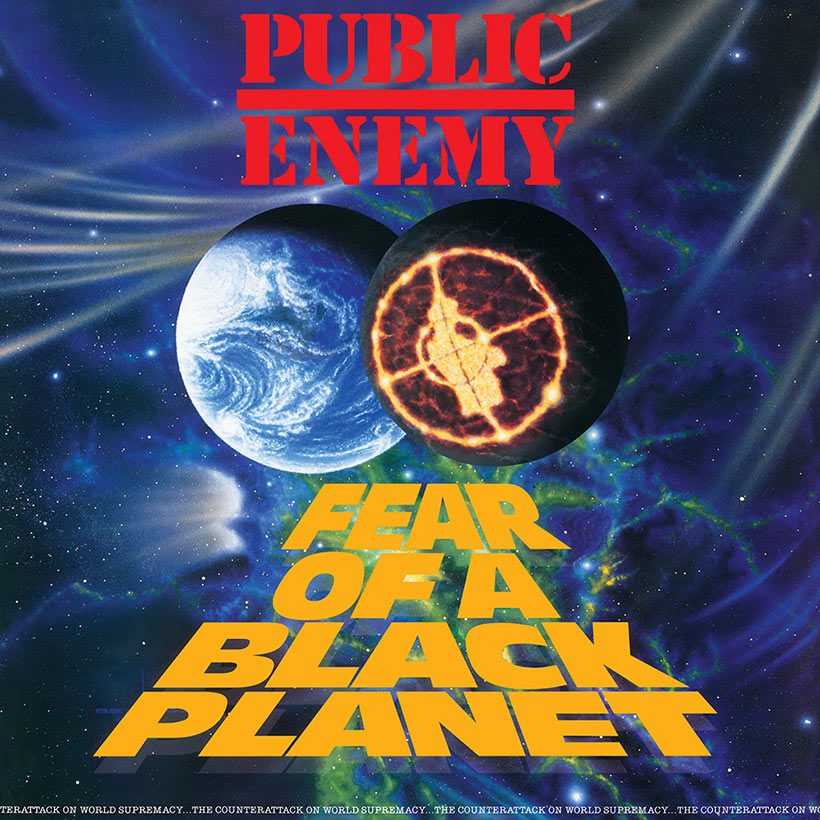‘Fear Of A Black Planet’: How Public Enemy Hit Back Against The World
An album beyond compare, ‘Fear Of A Black Planet’ found Public Enemy issuing calls for a survivable lifestyle amid tremendous pressure… Sound familiar?

The meteoric rise in profile delivered by the huge success of their second album, It Takes A Nation Of Millions To Hold Us Back, placed Public Enemy under the microscope. Chuck D’s lyrics were analyzed more closely. Flavor Flav was now a major pop personality, his visage and clock-carrying style providing a balance and “acceptable” image for a group that often presented lyrics that were highly challenging to the status quo – be that for white or black audiences. Professor Griff, the group’s Minister Of Information, faced particularly intense scrutiny, and comments he made in an interview in the spring of 1989 resulted in a media feeding frenzy which led to him being fired from the group – temporarily at least – and a brief disbandment of Public Enemy. When they reconvened to record their third album, Fear Of A Black Planet, Griff was notably absent.
Anyone could see that Public Enemy, and notably its main man, Chuck D, were under pressure as they entered the studio that summer. This pressure, however, resulted in one of the edgiest, hardest, and fiercest records in the hip-hop canon.
Listen to Fear Of A Black Planet right now.
Pulling no punches
Packed with Public Enemy classics and somehow even louder and rougher than its predecessor, Fear Of A Black Planet, released on April 10, 1990, pulls no punches. As ever, the group were not only concerned with the present and the future of black people, they were steeped in black history and culture. That can be seen on the most superficial level: their samples are a lesson in hard funk and their song titles show PE know music: “Brothers Gonna Work It Out,” a title drawn from a 1973 Willie Hutch classic; “Fight The Power,” from an Isley Brothers song; “Power To The People,” perhaps partially inspired by Joe Savage’s “All Power To The People” (a song probably released in aid of the Black Panthers, in 1968), or Joe Henderson’s 1969 album of the same title.
Here is a group at the peak of its powers, knowing what it says is going to be heard and fighting to deliver it in the most uncompromising way possible in the face of criticism, fury, incredulity, and misunderstanding, as heard on the radio clips that appear on “Incident At 66.6 FM.” If their intention, at the least, was to make listeners think, they succeeded.
This time around, one of the biggest tunes was Flavor Flav’s showcase, “911 Is A Joke,” a brassy, rolling groove with a point: people in the projects can’t rely on the help the rest of society takes for granted. “Welcome To The Terrordome” drops like a piano from a skyscraper, with Chuck quoting the titles of other songs for a moment before he kicks off a flow that is the work of a man under attack. Paranoid? Perhaps, but they really were out to get him and his people, Chuck’s rhymes taking in crucifixion, racist killings, heroes assassinated, a lack of black unity, and the whole nine yards.
Fear of a black planet
The album’s title track is a shower of funk, with cartoon-like use of vocal clips while Chuck mocks white fear of black people and points out a few home truths as he sees them. A similar fury simmers behind “Pollywanacracka,” but the approach this time is downbeat, quietly explaining a situation in which black people choose white lovers as a status symbol. “Burn Hollywood Burn” features a dream team of Chuck, Ice Cube, and Big Daddy Kane: Cube would soon be making his own movies in Tinseltown, but here his fire is directed squarely at the West Coast dream factory.
On “Revolutionary Generation” a call for unity between sister and brother is served up with references to slavery and oppression; yes, that is a bit of “Pass The Dutchie” incongruously thrown in amid a tangle of samples that keep the ears alert. Flav lands another showcase in “Can’t Do Nuttin For Ya Man,” necessary leavening amid the polemic and power, with the man who knows what time it is telling a tale of being chased down by hustlers, beggars and dudes who f__ked up.
An album beyond compare
Terminator X drops “Leave This Off Your F__kin’ Charts,” exemplary mixology with a title that didn’t really apply since PE had no problem charting back then. Together with “B Side Wins Again,” this is Fear Of A Black Planet’s most B-boy offering: total hip-hop. “War At 33 ⅓” is a mass of ideas, ranging from cars to fake evangelists, religious divides and African-Americans’ second-class status in a racist America. The album closes with “Fight The Power,” another PE classic, rolling on a diced and re-glued beat from The JBs’ “Hot Pants Road,” left to the end just to make you want to go back to the start and hear it all again. Ah, there is Elvis and John Wayne… you knew they had to be here somewhere, getting dissed.
There is more; the internet isn’t hasn’t got the capacity to cover everything in this record. “Controversial” isn’t a big enough word for it; funky is hardly an adequate description for the firepower of The Bomb Squad’s grooves; Chuck’s lyrics are more than mere rhymes. These aren’t songs, they’re calls for a survivable lifestyle, a series of theories, an expression of what was wrong, and what is still wrong – sometimes wilfully so. It’s like Chuck D anticipated the haters-gonna-hate credo that exists now, and decided he might as well speak his mind anyway.
The result was an album beyond compare: thrilling, infuriating at times, educational, funny, and deep enough to keep you finding new things in it three decades after it was unleashed on a planet that feared, loathed, and loved it.












